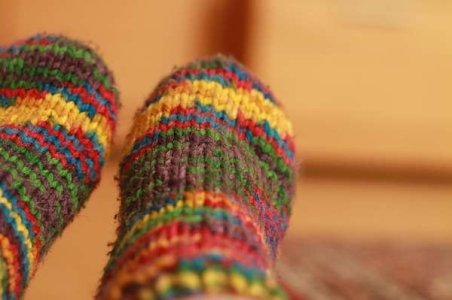Experts reveal the shocking benefits of wearing socks to bed–Should you start doing this?
- Replies 0
Disclaimer: The information provided in this article is for educational purposes only and is not intended as a substitute for professional medical advice, diagnosis, or treatment. Always consult your physician or other qualified healthcare providers with any questions you may have regarding a medical condition or before making any changes to your health regimen.
As the nights grow longer and the chill in the air deepens, many of us at The GrayVine are reaching for extra blankets and considering all options to stay warm.
One surprisingly contentious topic is the practice of wearing socks to bed. It's a debate that divides many: some swear by it for a cozy night's sleep, while others can't imagine anything less comfortable.
But what does science say about this bedtime habit? Could slipping on a pair of socks before you tuck in actually improve your sleep?
The idea of wearing socks to bed might seem odd to some, but there's a compelling physiological explanation behind it.
When you warm your feet, a process known as distal vasodilation occurs. This fancy term simply means that the blood vessels in your extremities widen, which can help to reduce your core body temperature.
And here's the kicker: a lower core body temperature is a signal to your brain that it's time to sleep, potentially helping you drift off faster and enjoy a deeper, more uninterrupted rest.

This could be particularly beneficial for those battling insomnia or anyone who finds themselves counting sheep into the wee hours.
But the benefits don't stop there. Here are a few more reasons to consider donning socks at bedtime:
1. Say goodbye to night sweats and hot flashes
For our readers navigating the waves of menopause, hot flashes can be a nightly nuisance. Wearing socks helps to regulate your body temperature, which may lead to fewer and less intense hot flashes, as well as a reduction in night sweats.
2. Relief for cold feet and Reynaud's syndrome
Cold feet aren't just a metaphor for second thoughts—they can be a literal discomfort that disrupts sleep. For those with Reynaud's syndrome, which causes blood vessels to narrow and limit circulation to certain areas, warm socks can be a godsend. They help maintain a steady temperature and blood flow, reducing symptoms like numbness and discoloration.
Before you reach for your daytime socks, let's talk about cleanliness. Our feet are home to a vast number of sweat glands, and throughout the day, they work overtime. This can create a less-than-ideal environment for bacteria.
A recent study found traces of Pseudomonas aeruginosa, a bacteria that can be resistant to antibiotics, on socks worn throughout the day. This bacteria can lead to various infections, including dermatitis and more serious conditions if it enters the bloodstream.
The solution? It's simple: change into a clean pair of socks before bed. This will help you avoid introducing any unwanted germs into your bed and keep your feet fresh throughout the night.
Ultimately, whether or not to wear socks to bed is a personal decision. If you find that wearing socks helps you sleep better, there's no harm in making it part of your nightly routine—just remember to keep it clean.
For those who prefer the freedom of bare feet but still want the benefits of a snug sleep, consider alternatives like weighted blankets, which can provide a sense of security and warmth.
Meanwhile, if you’re struggling to sleep, you might want to try these tricks to add more time to your well-deserved slumber.

Have you tried sleeping with socks on? Did it make a difference for you? Or do you have other bedtime rituals that help you achieve a peaceful night's sleep? Share your experiences and insights in the comments below!
As the nights grow longer and the chill in the air deepens, many of us at The GrayVine are reaching for extra blankets and considering all options to stay warm.
One surprisingly contentious topic is the practice of wearing socks to bed. It's a debate that divides many: some swear by it for a cozy night's sleep, while others can't imagine anything less comfortable.
But what does science say about this bedtime habit? Could slipping on a pair of socks before you tuck in actually improve your sleep?
The idea of wearing socks to bed might seem odd to some, but there's a compelling physiological explanation behind it.
When you warm your feet, a process known as distal vasodilation occurs. This fancy term simply means that the blood vessels in your extremities widen, which can help to reduce your core body temperature.
And here's the kicker: a lower core body temperature is a signal to your brain that it's time to sleep, potentially helping you drift off faster and enjoy a deeper, more uninterrupted rest.

Sleeping with socks on can offer benefits such as improving sleep quality, reducing hot flashes, and alleviating symptoms of Raynaud's Syndrome. Image source: Kristina / Pixabay.
This could be particularly beneficial for those battling insomnia or anyone who finds themselves counting sheep into the wee hours.
But the benefits don't stop there. Here are a few more reasons to consider donning socks at bedtime:
1. Say goodbye to night sweats and hot flashes
For our readers navigating the waves of menopause, hot flashes can be a nightly nuisance. Wearing socks helps to regulate your body temperature, which may lead to fewer and less intense hot flashes, as well as a reduction in night sweats.
2. Relief for cold feet and Reynaud's syndrome
Cold feet aren't just a metaphor for second thoughts—they can be a literal discomfort that disrupts sleep. For those with Reynaud's syndrome, which causes blood vessels to narrow and limit circulation to certain areas, warm socks can be a godsend. They help maintain a steady temperature and blood flow, reducing symptoms like numbness and discoloration.
Before you reach for your daytime socks, let's talk about cleanliness. Our feet are home to a vast number of sweat glands, and throughout the day, they work overtime. This can create a less-than-ideal environment for bacteria.
A recent study found traces of Pseudomonas aeruginosa, a bacteria that can be resistant to antibiotics, on socks worn throughout the day. This bacteria can lead to various infections, including dermatitis and more serious conditions if it enters the bloodstream.
The solution? It's simple: change into a clean pair of socks before bed. This will help you avoid introducing any unwanted germs into your bed and keep your feet fresh throughout the night.
Ultimately, whether or not to wear socks to bed is a personal decision. If you find that wearing socks helps you sleep better, there's no harm in making it part of your nightly routine—just remember to keep it clean.
For those who prefer the freedom of bare feet but still want the benefits of a snug sleep, consider alternatives like weighted blankets, which can provide a sense of security and warmth.
Meanwhile, if you’re struggling to sleep, you might want to try these tricks to add more time to your well-deserved slumber.
Key Takeaways
- Sleeping with socks on can offer benefits such as improving sleep quality, reducing hot flashes, and alleviating symptoms of Raynaud's Syndrome.
- Potential downsides of sleeping with socks include promoting bacteria growth due to sweat, especially if socks are worn throughout the day and not changed before bed.
- Health experts suggest wearing a clean pair of socks just for bedtime to minimise bacterial risks and maintain foot hygiene.
- Personal preference plays a significant role, and alternatives such as weighted blankets can be considered for those who dislike wearing socks to bed.
Have you tried sleeping with socks on? Did it make a difference for you? Or do you have other bedtime rituals that help you achieve a peaceful night's sleep? Share your experiences and insights in the comments below!






